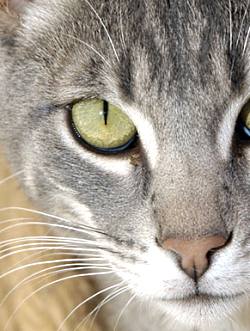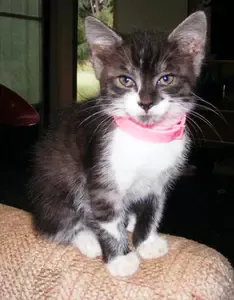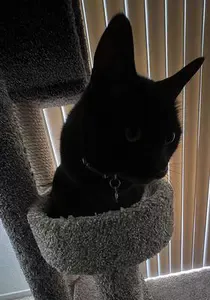Cat Vaccinations: What YouShould Know About Vaccines
Cat vaccinations are administered to provide protection for your cat against preventable feline illnesses.
There is, however, some controversy over certain risks, as well as the effectiveness of some of them.
There's also debate concerning the optimal vaccination schedule for some vaccines, and whether or not the non-core vaccines should be administered.
Note: Different veterinarians may have different recommendations surrounding cat vaccinations based on your circumstances and their experience. Ultimately, you'll want to work with your veterinarian on which vaccines your cat should receive and on what schedule.
To some degree, geography, the lifestyle of your cat, and other factors may enter into your decision making process. Below is information on some of the issues to help you with those decisions.
The Importance of Vaccinations for Your Cat

On average, house cats are living longer these days than in the past.
While this can be attributed to a number of things, the American Veterinary Medical Association (AVMA) states that vaccines are responsible for saving the lives of millions of pets.
Much as in humans and other animals, cats are susceptible to certain infectious diseases. Some cat illnesses can be prevented, some of which can be fatal.
Some of these diseases can be transmitted through casual contact with objects or infected animals, and others require something more direct, such as a bite wound.
According to pet health professionals, it is therefore important to have your cat vaccinated, preferably starting as a kitten, especially in the case of the four "core" vaccines.
There is some debate, however, over the optimal and safe vaccination schedule, and what constitutes "over-vaccinating." As such, some feline health experts are concerned about the potential risks and side effects of the current protocol for cat vaccinations.
Some vaccines are more effective than others. Some can prevent infection and therefore the spread of the disease. Others can lessen the severity or mask the symptoms, should your cat contract the disease.
Masking the symptoms of a sick cat, however, may not be in the best interest of that cat, or any other healthy cats the cat might live with.
Core Cat Vaccinations

There are core and non-core vaccines for house cats. Core vaccines are those that experts say should be given to every cat, and non-core are those that are given based on individual circumstances.
The recommended four core vaccines for cats are:
- Feline panleukopenia (FPV -- feline distemper)
- Feline calicivirus (FCV)
- Feline viral rhinotracheitis or feline herpesvirus-1 (FHV-1)
- Rabies
Due to the prevalence of these diseases as well as the severity, it's recommended that all kittens should be vaccinated against these diseases.
In the US, rabies boosters are required by law.
The other three vaccines are often given yearly (per manufacturers' recommendations). Some veterinarians, cat health researchers, and the American Association of Feline Practitioners (AAFP), however, are now recommending every three years instead.
In addition, many holistic veterinarians are vaccinating only where indicated by titer tests (where law allows).
Non-core Vaccines
Which non-core vaccines a cat should receive will depend on a number of factors, including:
- Age and breed of cat, and whether or not the cat is used for breeding
- Current health status of the cat and medical history, including allergies to vaccines
- Likelihood of the cat being exposed to an animal that has the illness
- The area in which the kitty lives (or may visit), and how common the disease is in those areas
- The type of vaccine administered and its effectiveness
- The lifestyle of the kitty (e.g. indoor/outdoor, show cat, the cat travels, etc.)
The non-core vaccines include:
- Feline leukemia virus (FeLV) (Feline leukemia virus symptoms)
- Feline infectious peritonitis (FIP) (FIP symptom list)
- Feline immunodeficiency virus (FIV) (Feline FIV)
- Ringworm (More about cat ringworm)
- Giardiasis
- Bordetella
- Chlamydiosis
The AAFP recommends that all kittens should receive FeLV vaccinations, but it's not recommended by all vets for adult cats who are not at risk (e.g, if your cat is 100 percent indoor and will not be introduced to strange cats, it's unlikely that she'll contract FeLV).
FIV vaccine is often only given to cats at high risk. Bordatella is for high risk kitties as well. The decision on Chlamydia vaccination is based upon the prevalence of the disease and whether or not the cat will be used for breeding. In my experience, ringworm, FIP, and Giardia vaccines are generally not recommended by vets.
Other factors as to whether or not to give non-core cat vaccinations include whether or not the cat resides with other cats who are infected with (or are carriers of) a disease, and boarding considerations (proof of vaccination may be required).
Risks and Side Effects
There are possible short term and long term risks of vaccination, as well as possible side effects, including:
- Allergic reactions
- Anaphylaxis (rare cases)
- Injection site sarcoma
- Possible damage to the immune system
The Cat Vaccination Schedule and Protocol
Kittens get their first immune boost from their mothers in the milk, but that only lasts for a short time. Per AAFP guidelines, vaccinations for kittens should start at about 6 to 8 weeks, depending upon the vaccine.
Boosters and follow ups depend upon the vaccine and individual circumstances.
Here's a typical cat vaccination schedule from Drs. Foster and Smith, and here's more information from AVMA on pet vaccines in general.
Indoor Cats vs. Outdoor Cats
The specific vaccinations that your cat should receive may vary depending upon your cat's potential for contact with other cats, and the elements. Typically, indoor cats will need less protection than outdoor cats.
What about indoor cats that go out into a protected enclosure?
Good question. I had this conversation with my own vet when I started letting my cats go out into the screened in enclosure. My vet recommended we treat them as outdoor cats and vaccinate accordingly, even though they were protected.
His reasoning was that while unlikely, it is possible the cats may encounter other cats and animals that might infect them with diseases.
The question is... is it possible that a stray cat or some other animal could break through the enclosure and bite or scratch your kitty?
The answer is probably yes, it's possible. Even if you have an outdoor enclosure, and your cat only goes outside in that protected enclosure, you may want to vaccinate as though your cat were an outdoor cat.
Obviously, this is an individual decision based on your circumstances. As always, you should discuss the benefits and risks with your veterinarian before making decisions on which vaccines you give, and how often.
Using Titers Instead of Vaccinating?
How long does the protection from a vaccine last?
Another good question. The American Association of Feline Practitioners (AAFP) recommends vaccinating against feline panleukopenia (FPV -- feline distemper), feline calicivirus (FCV), and feline viral rhinotracheitis/(FHV-1), "no more frequently than" every three years.
The current manufacturers' directions, however, are to vaccinate annually. Obviously, one might conclude that a drug manufacturer would encourage more frequent vaccinations in order to increase revenue.
On the other hand, we could assume that there may be liability issues at work, and the manufacturer would not want to promise more than they can deliver. There are also possible financial implications for veterinarians.
Concerned about the risks of excessive use of cat vaccinations, however, some holistic veterinarians are turning to another way.
Rather than vaccinate on any given schedule (such as the one year manufacturer recommendation, or three years as suggested by AAFP), these vets rely on titers to determine whether or not to vaccinate.
What's a titer? A titer is basically a way of testing immunity using a blood antibody test, and is relatively inexpensive when compared with vaccinating.
In an article in the Fall/Holiday 2008 edition of Feline Wellness magazine, veterinarian Shawn Messonnier, DVM, said that in his experience, "most cats only require vaccination a few times in their lives."
My research indicates there is some controversy over using titers, as there is no standard for the results. Apparently, cats with a higher antibody titer are not necessarily protected, and cats with a lower titer may not be unprotected.
In addition, many traditional veterinarians often don't know how to interpret the results, and so are reluctant to use them.
Many holistic vets, like Dr. Messonnier however, rely on titers to determine whether or not their patients need to be vaccinated.
Dr. Messonnier says...
Unfortunately, the titer test is not perfect. It is, however, the only test that inexpensively allows us to look at an important part of your cat's immune system. Without the information, no veterinarian can accurately recommend a safe and effective vaccination interval.
...using titer tests as a guide for vaccinating your cat is much better than vaccinating every year, every three years, or based on some other arbitrary recommendation.
Books by Dr. Messonnier:
Post Vaccination Care
My vet always warns me that on the day of vaccination, my cat may be a bit lethargic and typically sleep a bit more than usual. A vet visit is always stressful, so you might want to give your cat some space, especially if she seems irritable.
Watch for signs of a reaction and call your vet immediately if you notice anything unusual or a change in behavior.
I try to make sure that kitties have a comfortable place to sleep it off, and if they're up to it later, give them a special treat. In my experience, sometimes they act perfectly normal for the rest of the day, other times, they sleep the day away.
Ultimately, It's Your Decision
This is a complex topic with differing views. Unless the law requires it, which vaccines your cat receives, and on what schedule, has to be a personal choice for each cat owner.
Check this page on the risks of vaccination and resources to help you make an informed decision.
Obviously, your cat's best interest is paramount, and each cat will have different circumstances. Consult with your veterinarian to determine what is best for your cat.


Comments: What do you think?
Have your say about what you just read. Leave me a comment in the box below.